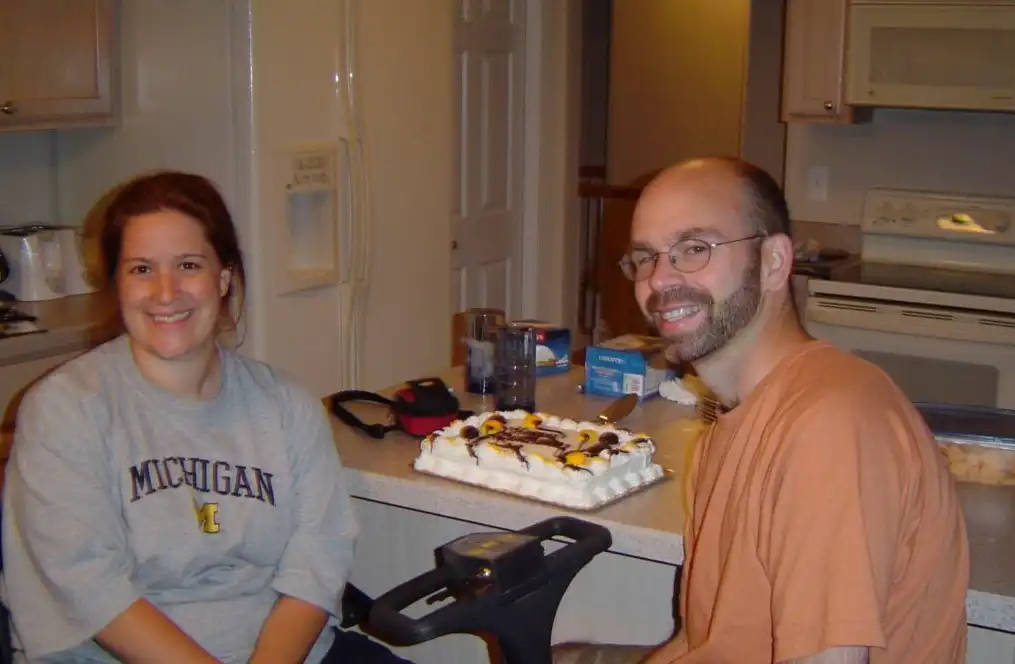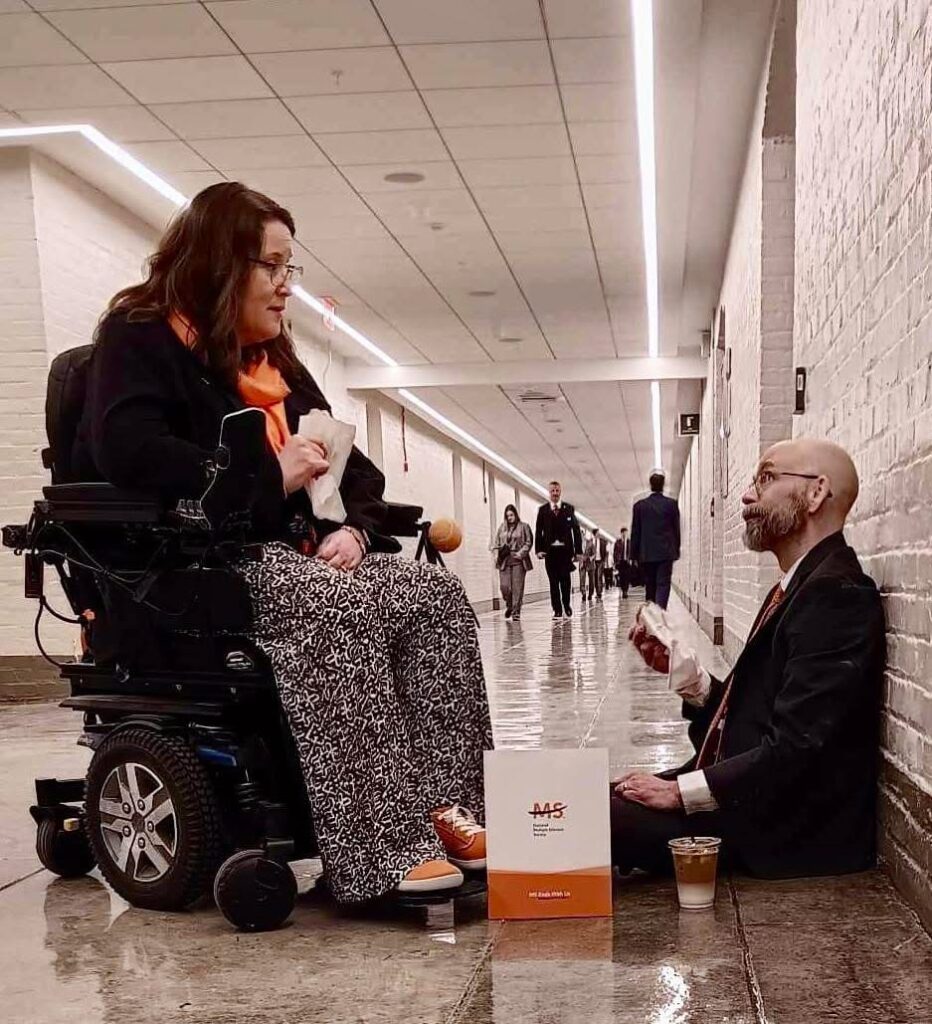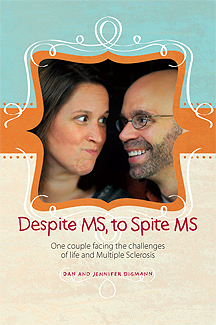
Listen to this Article
For Dan and Jennifer Digmann, residents of Michigan, USA, living with multiple sclerosis has taught them that adventure begins with preparation, but also with trust: in each other, in strangers who step up at the right moment, and in the idea that the world can be more accessible than it first appears. Every trip they take is proof that “yes” is still possible.
Dan and Jennifer both live with multiple sclerosis. Jennifer uses a power chair and hasn’t walked in over 20 years. Dan manages symptoms that don’t always show. They’ve built a travel style that mixes planning, humour and a firm belief in people. Their tips encourage you to say yes to travel.
They learned that lesson early on their honeymoon in Toronto, a city that made accessibility feel natural. The subway was accessible, the Blue Jays game easy to reach, and the hotel staff attentive without making a fuss. At the InterContinental, they quickly discovered how effortless the experience could be. When Jennifer remarked on how smoothly everything worked, one staff member simply smiled and said, “Why wouldn’t it be?” That casual reply stayed with them, a reminder that accessibility shouldn’t feel extraordinary, just expected.
It also reinforced a truth they live by: focus first on the pieces you can control.
The couple’s accessible van is a freedom machine. Road trips let them pack a few items that change everything. A bedside commode raises seat height for safe transfers. A gait belt sits in the bag for those rare times when two sets of hands make a transfer smoother. Bottled water rides along for cooling and hydration. They travel during daylight, skip winter roads and pay for roadside assistance so a flat tire turns into a phone call, not a crisis.
Flights take extra thought, yet they fly. Detroit is their preferred hub because it cuts out connections. Direct flights dodge tight layovers where a wheelchair might miss a transfer. When they do fly, Delta agents have met them at the gate and promised “white glove treatment” for the power chair. Staff have come around counters to speak at eye level. That kind of care sticks.

Air travel still brings tricky moments. Jennifer boards with an aisle chair, then transfers into the seat. On one regional trip, her chair wouldn’t fit through the cargo door. Delta rebooked them, fed them, put them up in the nicest Roanoke hotel. Early in their flying years, a quick connection in Atlanta meant a frantic push in a standard airport chair with no seatbelt. A fellow traveller jumped in to help steady Jennifer during a sprint through the concourse. It made a nerve-racking moment feel human again.
Long flights demand strategy. Bladder needs matter for both of them. Jennifer can’t access the onboard lav. A six-hour hop to California meant seven hours seated when you include early boarding and a slow exit. They plan for that window with input from clinicians and careful timing for fluids. On short trips they sometimes eat salty pizza the night before to manage output during the drive, then catch up on water on arrival. Not a diet tip, just a practical move that works for them.
Hotels are the make-or-break. The accessible room decides whether the day ends in rest or tension. Bed height is a silent variable. Too low and Dan can’t safely assist with transfers. Too high and independent movement gets harder. They’ve found standouts across brands, including Hilton properties that simply get the details right. A surprise winner sits in Anamosa, Iowa. The AmericInn there has grab bars and fixtures placed with function in mind. Less decor clutter means space to turn a chair. Fewer end tables, better sleep. For research, they like resources that list measurements such as bed height, since photos alone can mislead.
When a crucial item won’t fit in a plane, they look local. During a Boston stay, Jennifer called a medical supply company and rented a commode for around $118. It arrived at the hotel before check-in and solved the transfer problem. They later donated it so the property would have one for the next guest. One call, huge impact.
Transit at a destination can be a wildcard. In some cities accessible taxis stop running on weekends. App-based rides with ramp-equipped vans may not always guarantee advance booking. The workaround is old school. Swap numbers with the driver who picks you up and set a return time. Rent an accessible van when distances grow. In New Orleans that choice kept schedules sane.
Heat can be one of MS’s toughest triggers, and Jennifer felt it on a sweltering Michigan summer day. At a highway rest stop, the combination of fatigue and temperature drained the last bit of strength from her legs just as she needed it most, inside a cramped public restroom. Transfers that usually went smoothly suddenly felt impossible. Dan, realizing he couldn’t safely manage alone, stepped into the hallway and asked if anyone nearby could lend a hand. A younger married couple didn’t hesitate. They came in quietly, without fuss or judgment, and the husband positioned himself exactly as Dan explained. Together, they gave Jennifer the safe lift she needed. There was no awkwardness and no pity, just steady, practical help at the right time. When it was done, they offered a quick smile and a simple “no problem” before walking away.
That moment, though fleeting, stuck with Dan and Jennifer. It reminded them that while accessibility features matter, so do the people around you. A stranger’s willingness to help transformed what could have been a frightening, exhausting experience into a story about resilience and humanity.
They embrace spontaneity. . . not every unplanned detour is a disaster. Once, on a drive near Grand Rapids, Dan missed an exit and the GPS rerouted them onto smaller back roads. Instead of frustration, the couple chose curiosity. Rolling past fields and orchards, they stumbled onto a little town they’d never heard of. There was no plan, no starred restaurant in a guidebook, just a quiet main street with a family-run diner. Inside, the staff noticed Jennifer’s chair and quickly shifted tables to make room without being asked. They ended up with a window seat looking out over the town square, sipping milkshakes and laughing about how a “mistake” had delivered one of their most relaxed afternoons. For Dan and Jennifer, that detour was a reminder that not every trip has to be tightly controlled. Sometimes, the best part of accessible travel isn’t getting exactly where you thought you were going. It’s finding a pocket of welcome and rest in the unexpected.
They also bring a simple relationship rule on every trip. Pack patience. If tempers rise, they name the real target. Frustration belongs to the disease, not the person you love. That mindset was forged at home, a week after their Toronto honeymoon, when a bathroom transfer went sideways and Jennifer slid gently to the floor. The fix came through clear words. I’m upset with MS, not with you. That sentence keeps them a team on rough days in new places.
Two decades in and the travel highlights keep coming. Dinner at the CN Tower. A stay at the Idlewyld Inn in London, ON. Baseball at Fenway and at home in Detroit. A future visit to the Pacific Northwest so Jennifer can show Dan her favourite places from earlier years. They keep travel regional when life calls for it, then stretch when conditions fit.
Their closing advice to readers who feel hesitant: start small. Try a day trip to a nearby city. Call the hotel and ask specific questions. Measure success in steps, not stamps. When a snag appears, note it, adjust, try again. Build a bank account of good experiences so the occasional bad day doesn’t wipe out your will to go. Travel will always ask for energy and with MS, there are just a few more requests, but none of them are insurmountable.
Dan and Jennifer prove the answer to travel can still be yes. Start with one drive, one game, one skyline then let yes gather speed.

